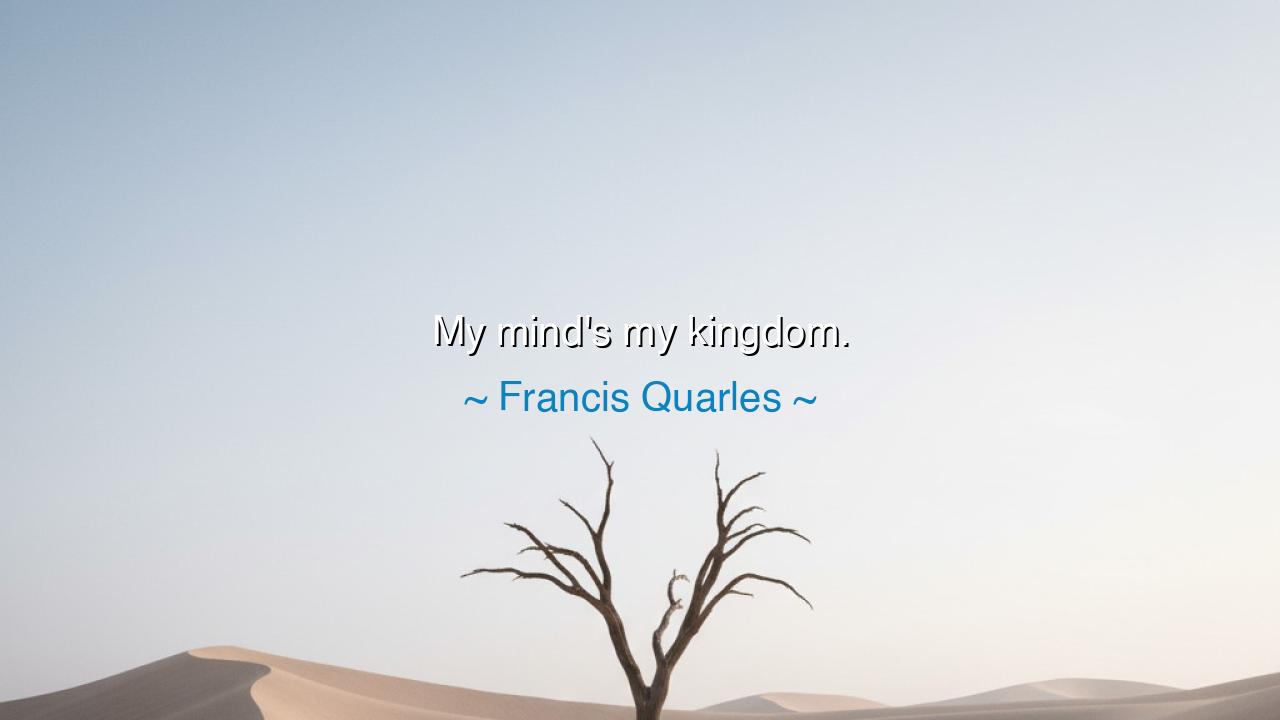
My mind's my kingdom.






“My mind’s my kingdom.”
Thus spoke Francis Quarles, the poet and divine of the seventeenth century, a man who knew both the tempests of the outer world and the stillness of the inner. In these few words lies a truth of ancient power — that within the citadel of the mind dwells a sovereignty that no tyrant can overthrow, no poverty can impoverish, no exile can cast out. It is a kingdom not of stone or silver, but of thought, faith, and will. He who rules his own mind is richer than a monarch; he who is ruled by it is poorer than a slave.
In the days of Quarles, England was a realm torn by strife. Civil wars raged, kings were beheaded, faiths were divided, and every man’s loyalty was tested in fire. Yet amidst that turmoil, Quarles withdrew into the sanctuary of contemplation. He learned, as few men do, that peace is not found in the world without, but in the world within. His kingdom was his mind — a fortress of reason, guarded by prayer, walled with wisdom, and crowned with faith. When his fortunes declined and his works were despised, still he could say, without bitterness, “My mind’s my kingdom.” For what can be taken from a man who has learned to rule himself?
Consider the story of Epictetus, the philosopher born a slave in Rome. Though his body was bound, his spirit was free. His master could command his limbs, but not his thoughts. “You may chain my leg,” he said, “but not my will.” He understood, as Quarles did, that the mind is a realm unto itself — infinite in its dominion, invincible in its liberty. The bars of a cell cannot imprison it; the loss of riches cannot impoverish it; the insults of men cannot wound it, unless it consents. Such mastery is the truest royalty, for kingship over oneself is a power that outlasts all earthly thrones.
The meaning of Quarles’ saying, then, is not pride, but sovereignty of the soul. It teaches that man’s greatest duty is to govern his thoughts as a king governs his realm — with justice, with discipline, and with mercy. For if the mind be disordered, no outward crown can bring peace; but if the mind be steadfast and serene, no storm can shake its throne. Every passion that tempts, every fear that whispers, every desire that drags the heart downward — these are the rebels in the kingdom of the mind, and it is for us to master them or be mastered.
The world today, though gilded with invention and comfort, is still plagued by the same ancient turmoil of thought. Men are enslaved not by chains, but by anxiety and doubt. They surrender their kingdoms daily — to anger, to envy, to despair. Yet within each of us lies the power to reclaim the throne. To say, like Quarles, “My mind’s my kingdom”, is to affirm that no circumstance, however cruel, can rob us of the inner freedom that defines the soul’s nobility.
Let this be the lesson to all who hear: guard your inner kingdom as you would guard a sacred temple. Cultivate thoughts of truth and gratitude as your loyal ministers; banish resentment and fear as traitors. When sorrow comes, receive it with dignity, as a king receives grave counsel. When joy visits, welcome it, but let it not make you forgetful of your duties. For the mind that governs itself with wisdom becomes unassailable — a light in darkness, a calm amidst storm.
So, my children, learn the ancient art of mastery within. Begin each day by standing before the gates of your own thoughts and declaring: “Here I reign.” Let not the noise of the world invade your peace, nor the shadows of doubt darken your spirit. For kingdoms rise and fall, empires crumble into dust, but the sovereign mind, steadfast and pure, endures beyond time. To rule that kingdom is the highest honor man can attain — and the only throne worth keeping.






AAdministratorAdministrator
Welcome, honored guests. Please leave a comment, we will respond soon